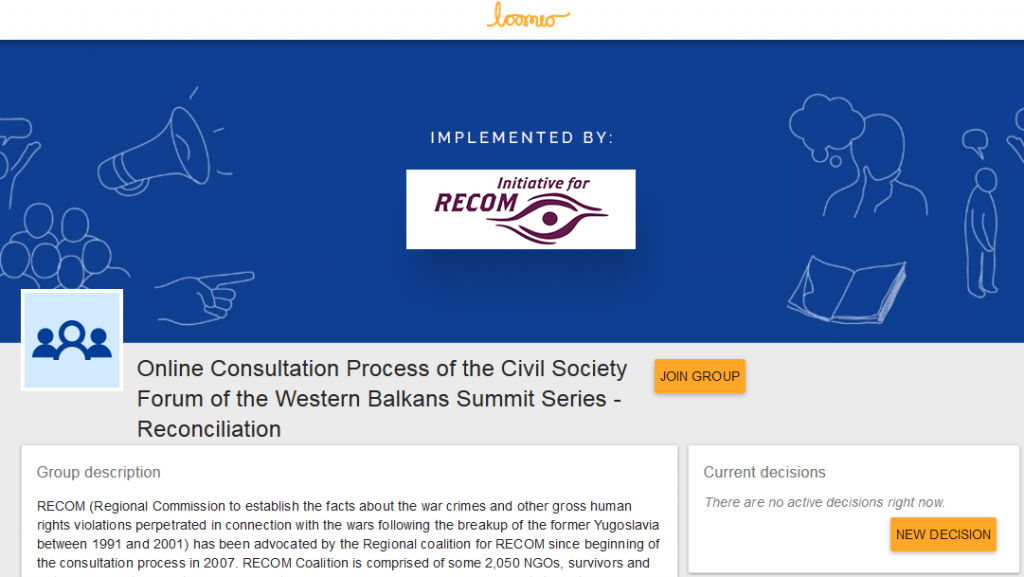
01.07.2017.
Online Consultation Process of the Civil Society Forum of the Western Balkans Summit Series – Reconciliation
Berlin Process, Civil Society, Establishment of RECOMGroup description
RECOM (Regional Commission to establish the facts about the war crimes and other gross human rights violations perpetrated in connection with the wars following the breakup of the former Yugoslavia between 1991 and 2001) has been advocated by the Regional coalition for RECOM since beginning of the consultation process in 2007. RECOM Coalition is comprised of some 2,050 NGOs, survivors and victims’ associations, veterans’ organizations, as well as numerous academics, artists, writers, lawyers and journalists from all the post-Yugoslav countries. The RECOM Coalition supports the establishment of this inter-state commission through its public advocacy, by gathering the documentation relating to the crimes, and by documenting the human losses suffered in connection with the wars of the nineties, and also all wartime detention sites.
The main task of the future Regional Commission is to create a registry of all civilians and combatants killed or missing in connection with the war, and of all wartime detention sites (as foreseen by RECOM’s three-year mandate).In order to help RECOM create a registry of all victims of the wars in the nineties, the Coalition had already begun to conduct empirical research into the human losses suffered in connection with the wars in Kosovo and Croatia, and, in 2014, began documenting the detention sites used to imprison civilians and POW’s during the war in B&H (1992 – 1995). To this date, the Coalition had gathered more than 17,000 statements from witnesses and victims’ relatives, some 12,000 victim photographs, and more than 30,000 other documents relating to the circumstances and contexts of their deaths or disappearances. Using these sources, the identities and the circumstances of the deaths or disappearances of around 23,000 victims have been established to date (out of the total of 130,000 individuals killed or missing in connection with the wars between 1991 and 2001) as well as 630 prison camps and detention sites during the war in B&H (out of total 1,500 detention sites).Also, the Hague Tribunal has established the identities and circumstances of the deaths of at least 18,000 victims of war crimes.
Although civil society organizations and the Hague Tribunal have completed a significant portion of the work on documenting the victims of the wars, it is of crucial importance for the process of reconciliation that this task is completed by all post-Yugoslav states. The Region’s political leaders have thus already agreed that “additional efforts are needed for achieving reconciliation within and between the societies in the region” , and that “concrete steps by political leaders in the Western Balkans towards lasting reconciliation in the region are necessary, as reconciliation is essential to promote stability and support the creation of an environment in South East Europe conducive to overcoming the legacy of the past”. Only official and joint initiative, as RECOM could complete the task of creating a unique registry of all victims, and in doing so, create the necessary conditions for official recognition of all the victims, and thus reconciliation itself.
Until now, European Commission has praised the Western Balkans leaders’ expressed support and willingness to work together to enhance the right to know the truth about the past, but lately the region’s political leaders neglected their obligations with regards to facing the past process. That is why the Berlin Process presents a unique opportunity for the European Commission to continue support for transitional justice in post-Yugoslav societies through the affirmation of the victims’ and society’s right to know the truth about what happened in the past, and persuade the participants in future Western Balkans conferences to take concrete steps and measures in this regard, and, most importantly, to sign an official agreement to establish RECOM at the very next meeting.
Civil Society Forum, which has become an important element of the Berlin Process, will bring together civil society organizations from the Western Balkans and the European Union on the occasion of the 4th intergovernmental summit of Western Balkans and EU countries that will be held in Trieste in July 2017 in order to elaborate policy proposals and to push forward actions that answer the main challenges facing the continent today. The forum will be structured around the topics of the Trieste WB Summit such as: youth cooperation, rule of law and anti-corruption, enterprise development and innovation potentials, reflection about the future of the “Berlin Process”. One of the topics that will be discussed is the topic of reconciliation in the Western Balkans and establishment of RECOM in the coming period.
In order to prepare comprehensive recommendations of civil society with regards to establishment of RECOM for the policy makers, we would like to invite you to join us in the more inclusive and participative online consultative process that will last until 22nd of June, 2017. The debate will cover five topics in relation to the issue of RECOM, dealing with the past and process of reconciliation. Each topic will be open for discussion for six days. We kindly ask you to submit your comments in English language. The results and recommendations will be summarized and carried forward to the “Civic Forum” in Trieste. Moderator of this group is Marijana Toma.
Threads














